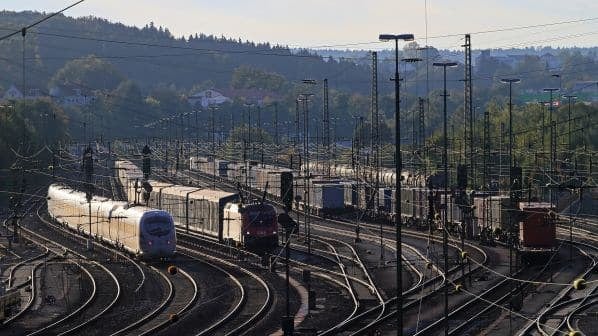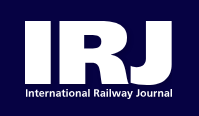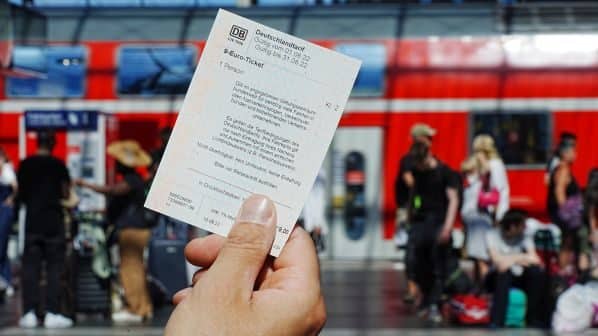AFTER weeks of uncertainty, the German government, formed by a three-way coalition of the centre-left Social Democrats, the Green Party and the Free Democrats, has released an updated coalition agreement including a major commitment to rail investment.
The 16-page agreement, which outlines a “modernisation package for climate protection and planning acceleration,” was released following 30 hours of negation between the German chancellor, Mr Olaf Scholz, and the heads of the Green Party and the Free Democrats.
The agreement says that German Rail (DB) needs about €45bn to cover its investment requirements until 2027. While not specifically committing to cover all of this shortfall, the coalition says the investment requirement will be “covered as far as financially feasible.” This includes the use of funding raised through the introduction of a CO2 surcharge on lorries, which will be used predominantly for investment in the railway. The “vast majority” of toll revenues from road will also be spent on rail from January 1 2024.
The document, which also outlines agreements on the Climate Protection Act and the installation of more climate-friendly heating systems in homes, says that, as an export nation, Germany needs high-performing transport infrastructure with rail as a central component of a modern and efficient transport network.
To achieve this, the planning, approval and implementation of rail projects will be accelerated through the Transport Approval Acceleration Act.
A maximum period of four years is to be introduced for approval procedures for rail projects on the Core Network of the Trans-European Transport Network (TEN-T).
The coalition has agreed to invest significantly more money in rail than in road. In the coming years, the federal government will provide substantial funds to modernise and expand the rail network, with a clear priority to increase capacity on the core network.
The government will accelerate the modernisation and expansion of the network to advance the implementation of the Deutschland Takt national regular-interval timetable. Capacity for intermodal transport will also be modernised and expanded.
The agreement includes a goal for rail freight to achieve a 25% market share by 2030. To achieve this, the proportionate subsidy regime for freight track access charges will continue.
Incentives for investment to introduce new digital, automation and vehicle technology will be strengthened. The use of existing infrastructure will also be significantly increased by rolling out digital capacity management, while the installation of ETCS onboard units will be expanded through the ongoing Stuttgart Digital Node project. Thirdly, technologies developed through the Digital Railway System (DBS) will be introduced.
The Deutschlandticket, introduced following the successful nine euro ticket, will also be integrated into the BahnCard 100 initiative, which provides unlimited rail travel for a set annual fee.
Response
“We welcome the results of the coalition committee to decisively reduce the investment backlog in the German rail network,” says DB CEO, Dr Richard Lutz. “The decisions really set the course for the rail network of the future. The conditions are now in place to work with our partners from the sector and industry to systematically modernise and digitise our outdated and failure-prone rail infrastructure.
“More quality and capacity on our congested network are the decisive key to achieving the ambitious growth targets for rail on the one hand, and improving currently unsatisfactory punctuality on the other. In short, this is good news for the climate, for people and for the economy. Now we need the entire rail industry to close ranks so that Germany gets a stronger railway and a better railway.”
Mofair, the association representing German private operators, said that the lengthy wait for the government to decide on the future level of support had been worth enduring.
“After months and years of indecision, important steps have now been taken, above all the combining of the previously separate financing channels for road and rail by transport minister, Mr Volker Wissing,” say Mofair president, Mr Tobias Heinemann. “The additional funds must go exclusively to infrastructure. This must be accompanied by a new financing architecture and an infrastructure manager oriented towards the public good.
“As much funding as possible must flow via construction cost subsidies, as only these have a neutral effect on competition and do not drive up track and station access charges. But especially, if there are to be renewed equity increases at the DB companies, the profit and loss transfer and control agreements between the monopoly divisions and the group holding company must be cut, completely separate balance sheets drawn up, and cash pooling and reciprocal lending ended.”
However, the new agreement removes a commitment to double passenger numbers by 2030 compared with pre-pandemic levels.
“Perhaps abandoning this target is realistic in view of the dilapidated state of the rail infrastructure and the upcoming general renewal programme, but it would have been more honest to say so,” says Mofair managing director, Mr Matthias Stoffregen.



